First Page of 13 Quality Literature Books
Are they indeed quality?
What makes them so?
The Swiss Family Robinson
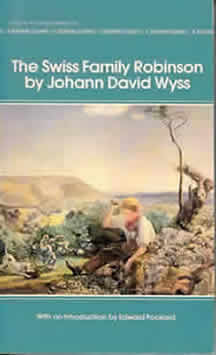 by Johann David Wyss - 1812
by Johann David Wyss - 1812
For many days we had been tempest-tossed. Six times had the darkness closed over a wild and terrific scene, and returning light as often brought but renewed distress, for the raging storm increased in fury until on the seventh day all hope was lost.
We were driven completely out of our course; no conjecture could be formed as to our whereabouts. The crew had lost heart and were utterly exhausted by incessant labor.
The riven masts had gone by the board, leaks had been sprung in every direction, and the water, which rushed in, gained upon us rapidly.
Instead of reckless oaths, the seamen now uttered frantic cries to God for mercy, mingled with strange and often ludicrous vows, to be performed should deliverance be granted.
Every man on board alternately commended his soul to his Creator, and strove to bethink himself of some means of saving his life.
My heart sank as I looked round upon my family in the midst of these horrors. Our four young sons were overpowered by terror. “Dear children,” said I, “if the Lord will, He can save us even from this fearful peril, if not, let us calmly yield our lives into His hand, and think of the joy and blessedness f finding ourselves forever and ever united in that happy home above.”
The White Stag
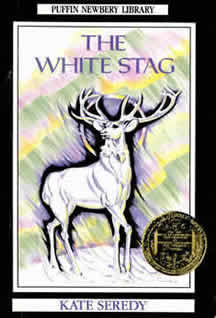 by Kate Seredy - 1937
by Kate Seredy - 1937
Old Nimrod, Mighty Hunter before the Lord, leaned wearily against the stones of the sacrificial altar. There was sadness in his face, dejection in the stoop of his broad shoulders. The altar stones were cold to his touch; many a sun had set since the tribe could pay tribute to Hadur, their powerful God. Sheep and cattle had died of a strange ailment, game had deserted forest and field; there was nothing o offer on the altar.
Once in a while he lifted his bowed head and looked around, his eyes searching the paths among the trees, his ears tuned to catch the slightest noise. Nothing stirred – silence hung heavy in the air. Then he would bow his head again and remain motionless, lost in thought for a long time. The formidable, snowcapped mountains around the altar place looked down on him in supreme indifference. They knew him as he knew them; he had hunted their thickly wooded slopes almost all his life. He knew that beyond these mountains were others, peak upon peak, steep, cold, almost impassable, an army of hostile mountains.
Miracles on Maple Hill
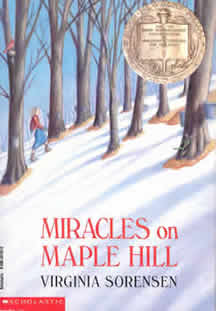 by Virginia Sorensen - 1956
by Virginia Sorensen - 1956
“Mother, say the scoot-thing again,” Marly said.
She slid forward in the car seat, talking right against her mother’s neck, over her coat collar. “Say it just the way your grandma said it.”
“Marly—again?” Mother asked. “And please don’t breathe down my neck, dear!” She was driving, and the road was narrow and snowy and worrisome.
“Just say it once more. The way she said it.”
Marly noticed the look Mother gave Daddy who sat beside her in the front seat. She could tell that Mother was afraid Daddy would abject to hearing the same thing over and over. He was more tired than usual, even. When he asked Mother to drive, he was always as tired as he could be. Now he sat with his eyes closed and his chin buried in the collar of his jacket.
But it was for him, really, that Marly wanted Mother to say the scoot-thing again. Maybe they didn’t think she knew why they were going to Maple Hill. But she did.
“Just once. I promise never to ask again. I promise,” Marly said.
Her Brother Joe turned from the window for a change. The whole way up from Pittsburgh he’d kept his face glued to it like an old fly.
The Witch of Blackbird Pond
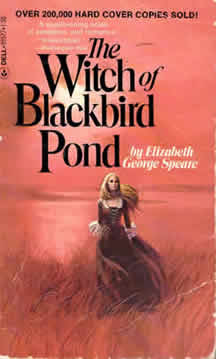 by Elizabeth George Speare - 1958
by Elizabeth George Speare - 1958
On a morning in mid-April, 1687, the brigantine Dolphin left the open sea, sailed briskly across the Sound to the wide mouth of the Connecticut River and into Saybrook harbor. Kit Tyler had been on the forecastle desk since daybreak, standing close to the rail, staring hungrily at the first sight of land for five weeks.
“There’s Connecticut Colony,” a voice spoke in her ear. “You’ve come a long way to see it.”
She looked up, surprised and flattered. On the whole long voyage the captain’s son had spoken scarcely a dozen words to her. She had noticed him often, his thin wiry figure swinging easily hand over hand up the rigging, his sandy, sun-bleached head bent over a coil of rope. Nathaniel Eaton, first mate, but his mother called him Nat. Now, seeing him so close beside her, she was surprised that, for all he looked so slight, the top of her head barely reached his shoulder.
“How does it look to you?” he questioned.
Kit hesitated. She didn’t want to admit how disappointing she found this first glimpse of America. The bleak line of shore surrounding the gray harbor was a disheartening contrast to the shimmering green and white that fringed the turquoise bay of Barbados which was her home.
The Incredible Journey
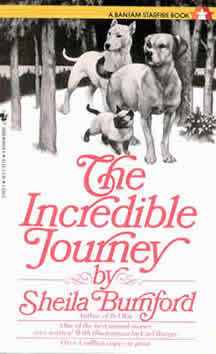 by Sheila Burnford - 1960
by Sheila Burnford - 1960
This journey took place in a part of Canada which lies in the northwestern part of the great sprawling province of Ontario. It is a vast area of deeply wooded wilderness – of endless chains of lonely lakes and rushing rivers. Thousands of miles of country roads, rough timber lanes, overgrown tracks leading to abandoned mines, and unmapped trails snake across its length and breadth. It is a country of far-flung, lonely farms and a few widely scattered small towns and villages, of lonely trappers’ shacks and logging camps. Most of its industry comes from the great pulp and paper companies who work their timber concessions deep in the very heart of the forests; and from the miners, for it is rich in minerals. Prospectors work through it; there are trappers and Indians; and sometimes hunters who fly into the virgin lakes in small amphibious aircrafts; there are pioneers with visions beyond their own life span; and there are those who have left the bustle of civilization forever, to sink their identity in an unquestioning acceptance of the wilderness.
Island of the Blue Dolphins
b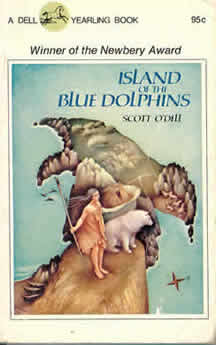 y Scott O’Dell - 1960
y Scott O’Dell - 1960
I remember the day the Aleut ship came to our island. At first it seemed like a small shell afloat on the sea. Then it grew larger and was a gull with folded wings. At last in the rising sun it became what it really was—a red ship with two red sails.
My brother and I had gone to the head of a canyon that winds down to a little harbor which is called Coral Cove. We had gone to gather roots that grow there in the springs.
My brother Ramo was only a little boy half my age, which was twelve. He was small for one who had lived so many suns and moons, but quick as a cricket. Also foolish as a cricket when he was excited. For this reason and because I wanted him to help me gather roots and not go running off, I said nothing about the shell I saw or the gull with folded wings.
I went on digging in the brush with my pointed stick as though nothing at all were happening on the sea.
The Phantom Tollbooth
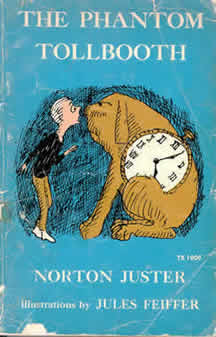 by Norton Juster - 1961
by Norton Juster - 1961
There was once a boy named Milo who didn’t know what to do with himself – not just sometimes, but always.
When he was in school he longed to be out, and when he was out be longed to be in. On the way he thought about coming home, and coming home he thought about going. Wherever he was he wished he were somewhere else, and when he got there he wondered why he’d bothered. Nothing really interested him – least of all the things that should have.
“It seems to me that almost everything is a waste of time,” he remarked one day as he walked dejectedly home from school. “I can’t see the point in learning to solve useless problems, or subtracting turnips from turnips, or knowing where Ethiopia is or how to spell February.” And, since no one bothered to explain otherwise, he regarded the process of seeking knowledge as the greatest waste of time of all.
A Wrinkle In Time
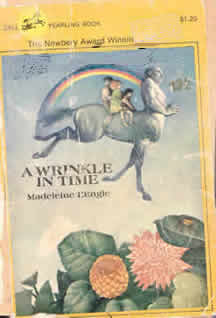 by Madeleine L’Engle - 1962
by Madeleine L’Engle - 1962
It was a dark and stormy night.
In her attic bedroom Margaret Murry, wrapped in an old patchwork quilt, sat on the foot of her bed and watched the trees tossing in the frenzied lashing of the wind. Behind the trees clouds scudded frantically across the sky. Every few moments the moon ripped through them, creating wraith-like shadows that raced along the ground.
The house shook.
Wrapped in her quit, Meg shook.
She wasn’t usually afraid of weather. – It’s not just the weather, she thought.
Mrs. Frisby and the Rats of NIMH
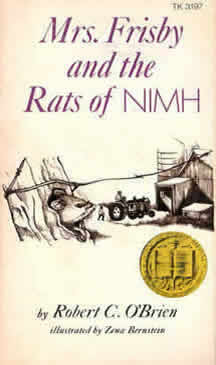 by Robert C. O’Brien - 1971
by Robert C. O’Brien - 1971
Mrs. Frisby, the head of a family of field mice, lived in an underground house in the vegetable garden of a farmer named Mr. Fitzgibbon. It ws a winter house, such as some field mice move to when good becomes to scarce, and the living too hard in the woods and pastures. In the soft earth of a bean, potato, black-eyed pea and asparagus patch there is plenty of food left over for mice after the human crop has been gathered.
Mrs. Frisby and her family were especially lucky in the house itself. It was a slightly damaged cinder block, the hollow kind with two oval holes through it; it has somehow been abandoned in the garden during the summer and lay almost completely buried, with only a bit of one corner showing above ground, which is how Mrs. Frisby had discovered it. It lay on its side in such a way that the solid parts of the block formed a roof and a floor, both waterproof, and the hollows made two spacious rooms.
Julie of the Wolves
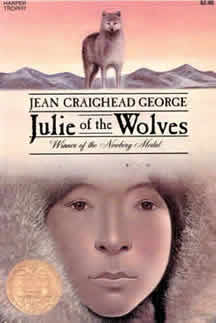 by Jean Craighead George - 1972
by Jean Craighead George - 1972
Miyax pushed back the hood of her sealskin parka and looked at the Arctic sun. It was a yellow disc in a lime-green sky, the colors of six o’clock in the evening and the time when the wolves awoke. Quietly she put down her cooking pot and crept to the top of a dome-shaped frost heave, one of the many earth buckles that rise and fall in the crackling cold of the Arctic winter. Lying on her stomach, she looked across a vast lawn of grass and moss and focused her attention on the wolves she had come upon two sleeps ago. They were wagging their tails as they awoke and saw each other.
Her hands trembled and her heartbeat quickened, for she was frightened, not so much of the wolves, who were shy and many harpoon-shots away, but because of her desperate predicament.
Tuck Everlasting
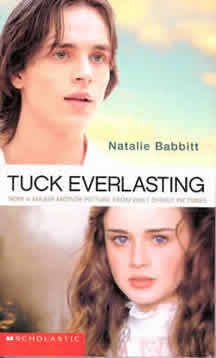 by Natalie Babbitt - 1975
by Natalie Babbitt - 1975
The road that led to Treegap had been trod out long before by a herd of cows who were, to say the least, relaxed. It wandered along in curves and easy angles, swayed off and up in a pleasant tangent to the top of a small hill, ambled down again between fringes of bee-hung clover, and then cut sidewise across a meadow. Here its edges blurred. It widened and seemed to pause, suggesting tranquil bovine picnics: slow chewing and thoughtful contemplation of the infinite. And then it went on again and came to last to the wood. But on reaching the shadows of the first trees, it veered sharply, swung out in a wide arc as if, for the first time, it had reason to think where it was going, and passed around.
On the other side of the wood, the sense of easiness dissolved. The road no longer belonged to the cows.
Roll of Thunder, Hear My Cry
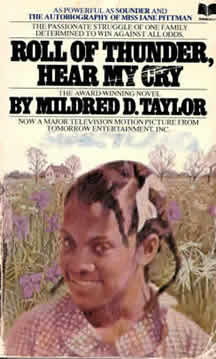 by Mildred D. Taylor - 1976
by Mildred D. Taylor - 1976
“Little Man, would you come on? You keep it up and you’re gonna make us late.”
My youngest brother paid no attention to me. Grasping more firmly his newspaper-wrapped notebook and his tin-can lunch of cornbread and oil sausages, he continued to concentrate on the dusty road. He lagged several feet behind my other brothers, Stacey and Christopher-John, and me, attempting to keep the rusty Mississippi dust from swelling with each step and drifting back upon his shiny black shoes and the cuffs of his corduroy pants by lifting each foot high before setting it gently down again. Always meticulously neat, six-year-old Little Man never allowed dirt or tears or stains to mar anything he owned. Today was no exception.
“You keep it up and make us late for school, Mama’s gonna wear you out,”
The Giver
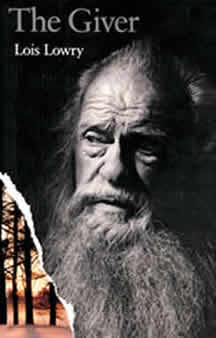 by Lois Lowry - 1993
by Lois Lowry - 1993
It was almost December, and Jonas was beginning to be frightened. No. Wrong word, Jonas thought. Frightened meant that deep, sickening feeling of something terrible about to happen. Frightened was the way he had felt a year ago when an unidentified aircraft had overflown the community twice. He had seen the sleek jet, almost a blur at its high speed, go past, and a second later heard the blast of sound that followed. Then one more time, a moment later, from the opposite direction, the same plane.
At first, he had been only fascinated. He had never seen aircrafts so close, for it was against the rules for a Pilot to fly over the community. Occasionally, when supplies were delivered by cargo planes to the landing field across the river, the children rode their bicycles to the riverbank and watched, intrigued, the unloading and the takeoff directed to the west, always from the community.
But the aircraft a year ago had been different. It was not a squat, Fat-bellied cargo plane but a needle-nosed single-pilot jet. Jonas looking around anxiously, had seen others – adults as well as children—stop what they were doing and wait, confused, for an explanation of the frightening event.
Home: Literacy, media, literature, children's literature, & language arts